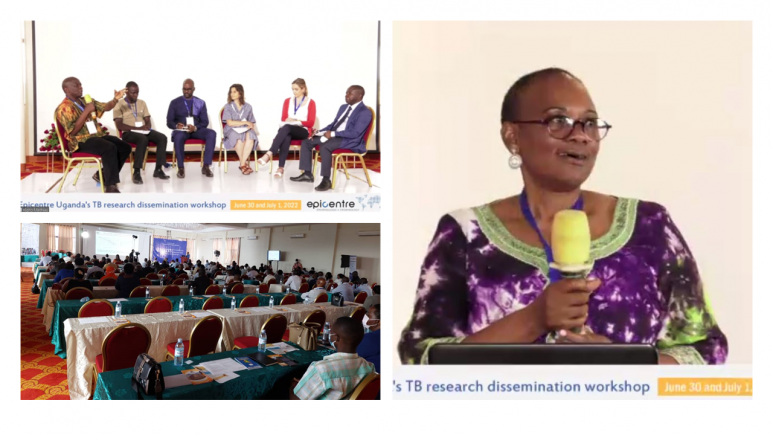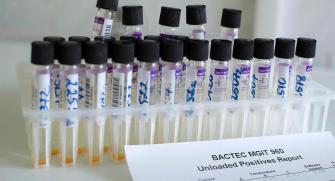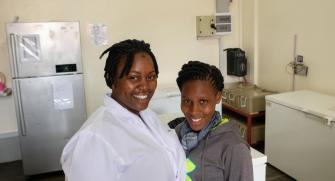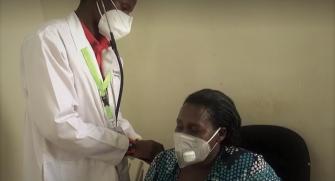What to remember from the TB workshop
In 2020, an estimated 10 million people worldwide contracted tuberculosis (TB), including 1.1 million children, and 1.5 million people died, including 214,000 who were HIV positive. TB is curable and preventable. In the last few years, there has been progresses in the diagnosis and treatment of TB. However, many of these new tests and treatment regimens have not been evaluated on the populations that could benefit the most. There is an urgent need to find diagnostic solutions, models of care and treatments adapted to all populations and contexts. Epicentre Research Centre in Mbarara, Uganda, works with its partners in measuring the extent of the disease in vulnerable populations, evaluating the implementation of new drugs, novel regimens, new diagnosis tests, and novel case management strategies to improve the patients’ outcomes. Indeed, a quarter of those diagnosed with TB live on the African continent, which suffers a high prevalence of HIV a risk-factor for the more rapid TB development in affected people. “In 2020, about 90,000 people developed tuberculosis in Uganda, including 12,000 children. A third were coinfected with HIV”, explains Dr Juliet Mwanga Amumpaire, Director Epicentre Mbarara Research Centre. Moreover, too many people, mainly children and people living with HIV, do not even know they are infected.” This workshop was an opportunity to review the latest studies conducted on tuberculosis by Epicentre with MSF and its partners, with support from various funders– Mbarara University of Science & Technology (MUST), Makerere University-John Hopkins University (MU-JHU) research collaboration, the National Tuberculosis and Leprosy Program (NTLP), Elizabeth Glaser Pediatric AIDS Foundation (EGPAF) - to reduce the burden of this disease in Uganda and more widely in Eastern Africa. Among the challenges discussed during this workshop are the under-diagnosis, because many people are unaware that they have the disease, the simplification of models of care and improved care for children and patients living with HIV. Here is a review of the studies presented.
FujiLAM study: simplify the diagnosis
One of the challenges in improving patient management and providing faster treatment is the development and evaluation of rapid, point of care tests, that do not require sputum and can be offered as close to the patient as possible. The FujiLAM antigenic test appears to be a promising alternative because it is performed on urine, produces results within one hour, and can be performed without a laboratory. The first analyses reveal a sensitivity with FujiLAM of 60% in HIV positive patients with a confirmed diagnosis of TB compared to 40% with AlereLAM, the currently WHO recommended urine antigenic test. They suggest an improvement in the diagnosis of TB in HIV-positive patients. This study is carried out with the support of ANRS|MIE (French Agency for Research on AIDS and Viral Hepatitis and Emerging Infectious Diseases), FIND and MSF.
CONTACT Study: improve diagnosis and initiation of treatment in children
The many gaps observed in the cascade of care of TB child contacts occur mostly in the screening, Tuberculosis Preventive Therapy (TPT) initiation & completion steps. One of the challenges is the necessity for parents to bring children to the health facility for TB screening and TPT initiation. CONTACT study compares the cascade of care between a community based approach with screening of contacts, initiation and follow-up of TPT in the household by a trained community health worker and the standard of care that is Facility based for TB screening and management of household TB child contacts in Uganda and Cameroon. Community-based interventions could improve TPT coverage and outcomes among child contacts in resource-limited settings. This study lead by the Institut de Recherche pour le Developpement (IRD) was part of large Unitaid-funded project, CaP-TB that was led by the Elizabeth Glaser Pediatric AIDS Foundation (EGPAF).
TB speed: to reduce child mortality by improving diagnosis
TB is among the top ten causes of death in children under 5 years worldwide, with 1.2M new cases and 230’000 deaths in 2019. Most children dying from TB are children (<5 years old) not accessing treatment, most likely because they are not diagnosed. The TB-Speed project carried out research activities in seven countries with a high incidence of TB and limited-resources: Cambodia, Cameroon, Côte d'Ivoire, Mozambique, Sierra Leone, Uganda and Zambia. The aim was to reduce childhood mortality, evaluating improved diagnostic approaches and tools (systematization of TB screening, microbiological diagnosis on stool and nasopharyngeal aspirate, simplified chest X-ray reading tool)), new models of care (decentralization of diagnosis to the health district level), adding systematic early detection of TB in young children with severe pneumonia. The TB-Speed HIV and SAM developed and evaluated diagnostic algorithms to guide rapid treatment decisions in vulnerable children living with HIV or malnutrition. The TB-Speed Pneumonia study showed that it was possible to detect and treat TB rapidly in children admitted with severe pneumonia. The TB-Speed Stool Processing study confirmed the good performance of a simplified stool sample preparation method for the molecular diagnosis of TB. This project was carried out by a large and multidisciplinary consortium under the leadership of the University of Bordeaux thanks to the Unitaid and Initiative funding and support from the ANRS|MIE.
STATIS: reduce TB mortality among people living with HIV
Many people living with HIV only access antiretroviral therapy when they are already severely immunosuppressed. Mortality following the initiation of treatment is therefore high in these patients, with tuberculosis being a common cause of death. In the context of difficulty to diagnose TB in this advanced immunosuppressed population, the STATIS trial hypothesized that systematic empiric TB treatment might be justified among severely immunosuppressed people in order to reduce mortality due to TB at the time of antiretroviral therapy initiation. The study conducted in Uganda, Cote d’Ivoire, Cambodia and Viet Nam did not report a benefit in terms of mortality reduction on this approach as compared to a treatment approach guided by an intensive TB screening. This study was funded by the ANRS|MIE.
Continue the fight against tuberculosis
“The results obtained from these studies already allow us to modify the way tuberculosis is managed," explains Dr Maryline Bonnet, a pulmonologist and researcher at the IRD, who oversees several trials on tuberculosis.
Some preliminary results of TB-Speed have already contributed to the revisions of the WHO Technical Guide and Operational Manual for TB published in March 2022. The sharing and the restitution of the studies with the ministry of Health, the National TB and Leprosy Program, and our partners will allow us to go further by laying the foundations for future studies.” Other studies are currently being finalized, such as Rifashort trial, which is evaluating the possibility of reducing the treatment of drug-susceptible TB to 3 or 4 months, compared to the current 6 months. Other large therapeutic trials such as the Datura and Intense TBM trials are underway under the supervision of Conrad Muzoora from MUST to evaluate new TB treatment strategies to increases the chances of survival of hospitalized adults and adolescents living with HIV and tuberculosis and patients admitted with TB meningitis.
“Efforts must therefore continue to adapt the management of tuberculosis to the most vulnerable people who are often the most affected and thus continue to fight against this disease which, according to WHO data, is the 13th leading cause of death and the second leading infectious killer after COVID-19” concludes Dr Juliet Mwanga Amumpaire.










